What are the current travel traffic light rules and how would an ‘amber watchlist’ work?
There are currently three main categories in the Government’s international travel traffic light scheme: Red, amber and green.
But there is also an ‘amber plus’ list and ministers are considering introducing an ‘amber watchlist’.
Below is a breakdown of the rules for each category:
Red: Travel to the UK from a red list country is banned for non-UK nationals. Brits returning must take a pre-departure test and book a 10 day stay in hotel quarantine at a cost of £1,750.
Amber: A pre-departure test is required while non-vaccinated people have to quarantine for 10 days at home and book tests on day two and day 8. The fully-vaccinated do not have to quarantine but they do have to book a day two test.
Amber Plus: A new category which currently only includes France. It means everyone returning from the country, including the fully-vaccinated, must quarantine at home for 10 days and take tests on day two and day eight.
Amber Watchlist: Ministers are considering introducing the category to highlight countries which are amber but at imminent risk of turning red.
Green: Returning travellers must take a pre-departure test and book a day two test as well. Quarantine is not required for anyone unless the test is positive.
Advertisement
International travel chiefs today warned the industry is in the ‘last chance saloon’ as the Government’s traffic light system continues to wreak havoc with summer holidays amid fears a new ‘amber watchlist’ could plunge the plans of 1.2million Brits into chaos.
The Government is considering rolling out the new category to identify countries which are currently amber but at risk of imminently turning red.
It is thought that Spain would be put on the list while there are fears that fellow holiday hotspots Greece and Italy could also follow suit.
Moving a country from amber to red at a moment’s notice would force travellers to scramble to return home or face having to pay £1,750 for a mandatory 10 day stay in hotel quarantine.
Travel experts said there are approximately one million British tourists currently in Spain along with 150,000 in Greece and 50,000 in Italy which means the fate of more than a million UK holidaymakers is now hanging in the balance.
Ministers are under mounting pressure not to go ahead with the move with Tory MPs warning it could cause a massive collapse in bookings, further decimating the beleaguered aviation sector.
Many Conservative MPs believe the red, amber and green system is now far too complicated and are demanding it be simplified.
But Digital Minister Matt Warman dismissed the concerns this morning as he said the system works fine as long as people ‘apply their common sense’.
He did not rule out introducing the new amber watchlist category, with Transport Secretary Grant Shapps due to provide an update on travel rules on Thursday this week.
He said ‘the point’ of such a watchlist is to ‘try and give people a sense of the direction of travel that a country is going in’.
Whitehall sources last night told the Mail that the plans could be scrapped as the backlash grows and after it emerged that Rishi Sunak had written to Boris Johnson to warn that the Government risked damaging the travel sector by imposing more ‘draconian’ measures than the UK’s EU rivals.
As of today fully-vaccinated arrivals to the UK who have been double jabbed in the US or the EU will no longer have to quarantine when arriving from amber list countries after a rule change.
The Chancellor said UK border policy was ‘out of step with our international competitors’ in a way that threatened to damage jobs.
Meanwhile, aviation bosses have called for the Government to scrap the requirement for returning travellers to take a PCR test and to replace it with a cheaper and faster lateral flow test.
In a ray of hope for millions of holidaymakers, industry experts last night released optimistic data which they say shows how 17 countries could be added to the quarantine-free green list or green watch list.
Countries including Germany, Austria, Poland and Canada, are among the countries most likely to go green due to low infection rates, according to travel experts.
It comes as it was revealed:
That free coffee and cinema tickets could be next incentives to beat Covid vaccine hesitancy in youngsters after the Government unveiled plans to to hand out Uber rides and takeaways to encourage Britons to go get the jab;That all over 50s across the UK will be offered a booster shot of Pfizer by Autumn in a bid to battle back variants;Meanwhile, Covid cases fell for the eleventh day in a row, with infections dropping by 16 per cent in a week to 24,470 and deaths stay low at 65;New figures also revealed a 10-year age drop in Covid patients due to the impact of the vaccine roll-out;But Conservative MP Jacob Rees-Mogg warned that enforcing Covid vaccine passports was ‘not a British way to behave’; 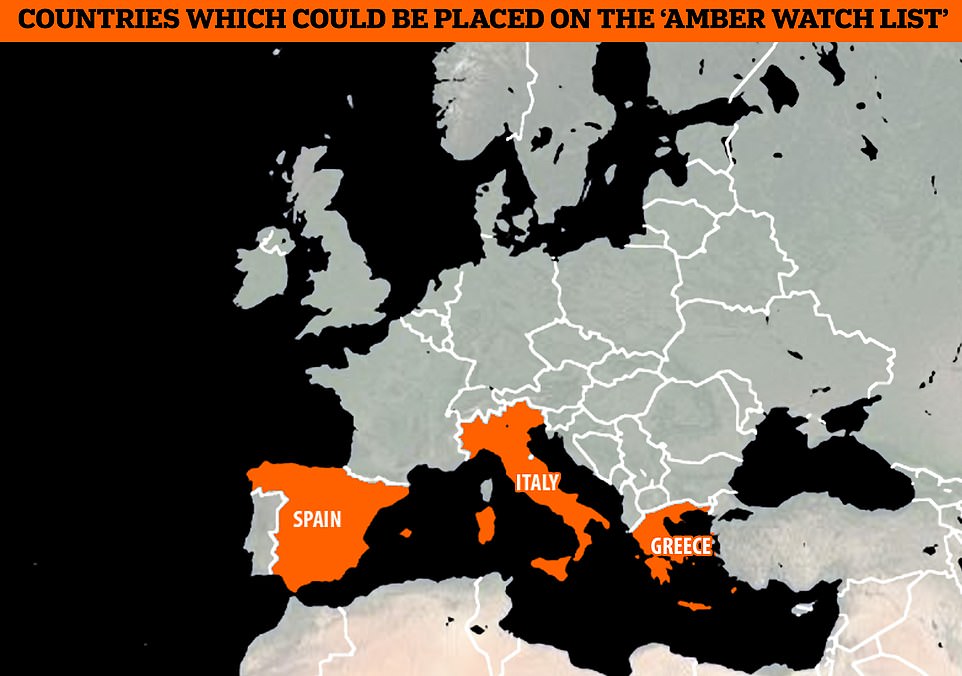
It is thought that Spain would be added to a new ‘amber watchlist’ while countries like Italy and Greece could also follow suit
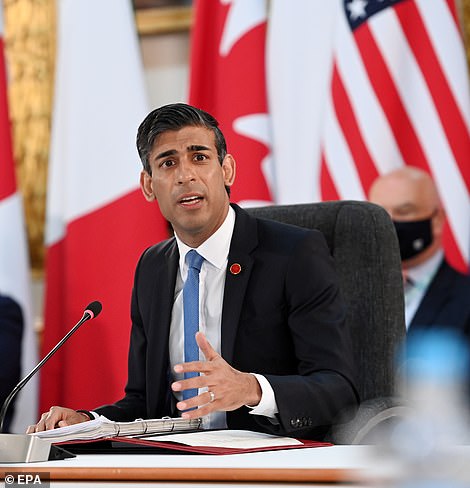
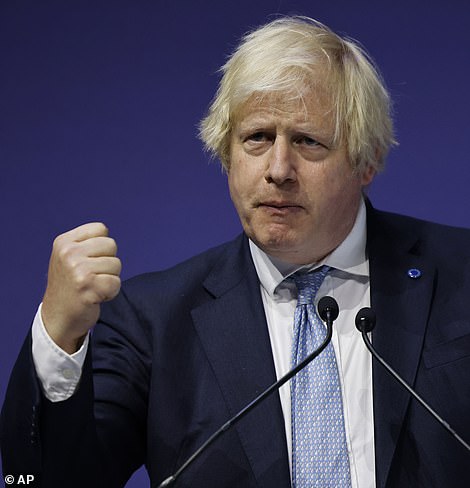
Boris Johnson is under pressure not to go ahead with the new category, with Rishi Sunak having written to the PM to express his concerns
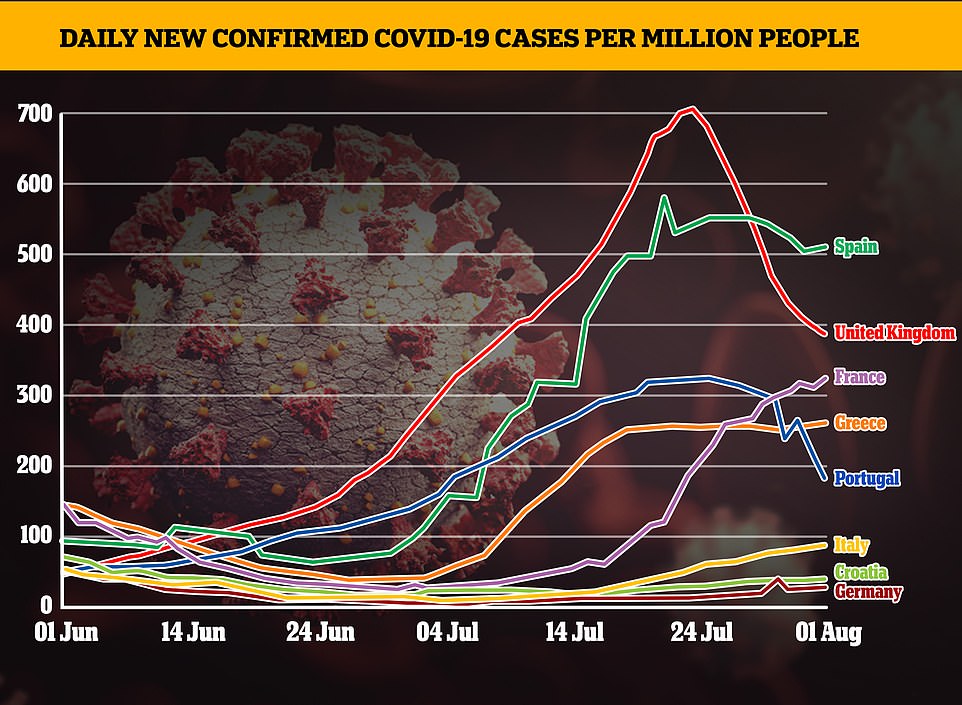
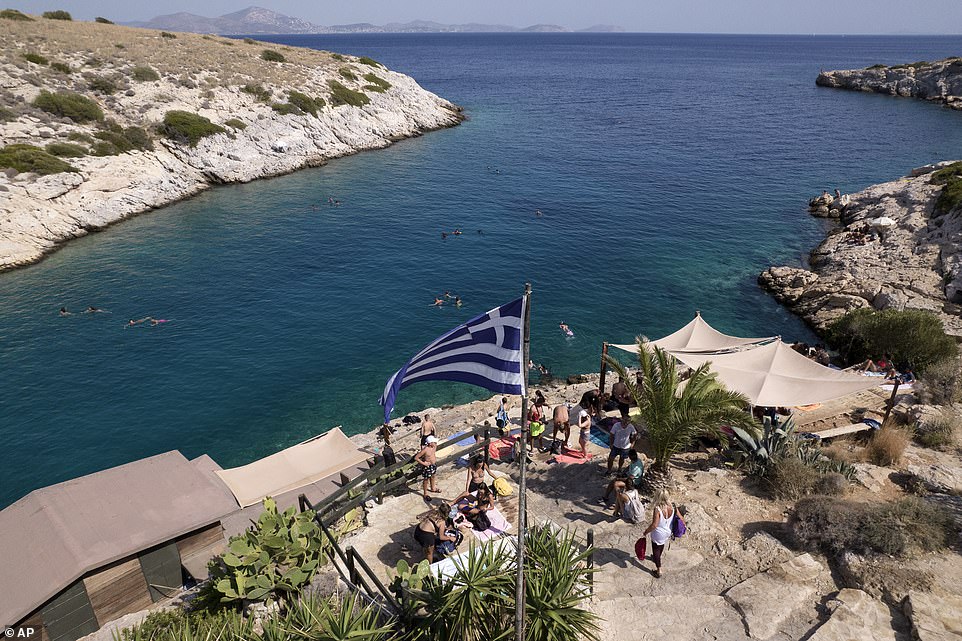
Tory MPs fear that formally creating the new amber watchlist would prompt a massive collapse in bookings to holiday hotspots like Greece
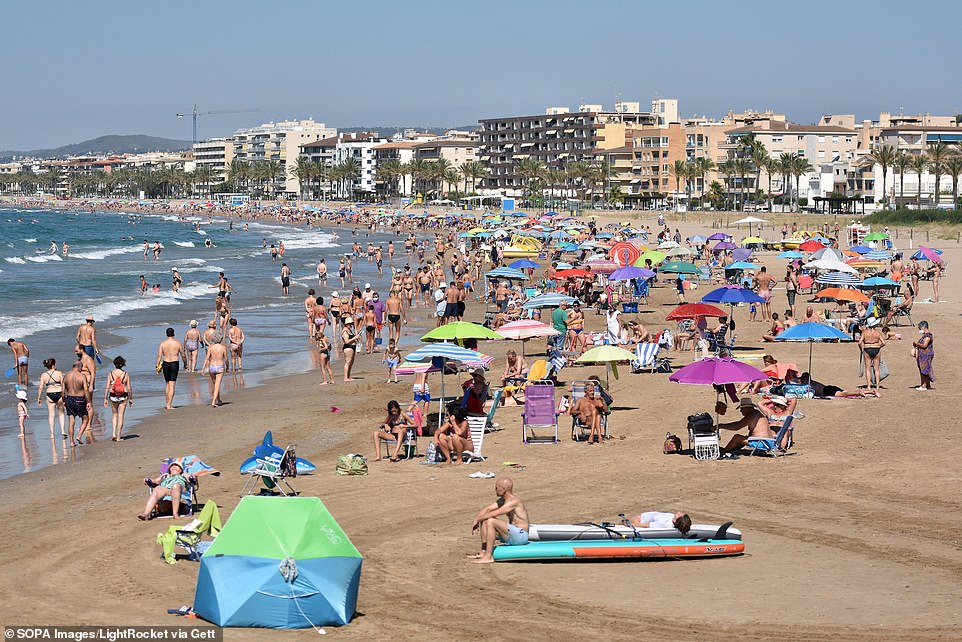
Moving a country from amber to red at a moment’s notice would force returning travellers to undertake a costly stay in mandatory hotel quarantine. A beach in Tarragona, Spain, is pictured last month
Fears of mass scramble back to UK as 1.2million holidaymakers in Spain, Italy and Greece face anxious wait for new amber watchlist
Airlines could face a mass scramble of tens of thousands of British holidaymakers trying to get home from the likes of Spain, Italy and Greece if all three end up on an amber watchlist.
An estimated 1.2million UK tourists are currently in the three countries – many of whom will be now fearing they could be moved from the amber list to red list at very short notice, if ministers press ahead with the new category.
The total number of Britons in the three countries is made up of an estimated one million in Spain, plus 50,000 in Italy and 150,000 in Greece.
And flight prices for returning from those nations to the UK could soar very quickly if demand skyrockets at a moment’s notice.
Hundreds of thousands more Britons will be planning to head out to the three countries over the next few weeks during the summer holidays, but thousands of these are known to have already cancelled.
Paul Charles, chief executive of travel consultancy The PC Agency, told MailOnline that many people are postponing because they ‘can’t be bothered with the faff of worrying and they can’t be bothered with the threat of higher testing costs’.
An exclusive poll for MailOnline last week found just 10 per cent of people intend to travel abroad for a summer holiday this year, while 4 per cent intend to travel both abroad and domestically in the coming weeks.
Advertisement
Aviation and tourism chiefs are increasingly concerned that the crucial summer holiday season is slipping away as ever-changing traffic light rules continue to put off many people from heading abroad.
Tim Alderslade, chief executive of Airlines UK, which represents the aviation industry, said: ‘The EU must be looking at us in incredulity.
‘We have totally squandered the vaccine dividend we had built up.
‘No wonder passengers have no idea whether they’re coming or going. Green is the only way forward for the industry – this is the last chance saloon now for saving the summer.’
Mr Alderslade told Times Radio this morning: ‘We’ve now only got six to eight weeks until the end of the summer, and tens of thousands of jobs are under threat in the travel and aviation sector.’
Probe into testing kits pricing
By Az Munrallee for the Daily Mail
Many of the Government’s cheapest Covid test kits are unavailable to holidaymakers, probing an investigation by the British advertising watchdog.
Private firms offering tests are listed on the Government’s website, with some advertised at £23. But analysis of the 50 least costly options found two thirds could not be ordered or appointments for on-site tests were not available until next month.
The Advertising Standards Authority is now investigating the issue following complaints over ‘inconsistent pricing’ of the kits that are mandatory for travel.
Unvaccinated amber list holidaymakers from England must have a test before they return to the UK, and have two PCR tests when they return during their quarantine. Vaccinated travellers need a test before they arrive and another when they return.
Consultancy firm Fideres, which carried out the analysis, said consumers should expect to pay around £114 for a two-test kit. The cheapest swabs for those returning from an amber list country was £78. The firm’s Paul Vella said: ‘The Government is reporting prices… without actually checking if these low prices are available.’
He also told The Guardian that travellers are being ‘misled’ and steered into ‘using more expensive providers’.
The Department of Health said: ‘We do not endorse or recommend any private Covid-19 test provider. All private providers must meet the minimum required standards.’
Advertisement
Travel expert Paul Charles said it would be a ‘disaster’ if the Government introduces the new category as he called on ministers to abandon the traffic light scheme entirely, warning firms are facing a ‘crunch week’.
The chief executive of travel consultancy The PC Agency, told MailOnline today that British tourists have already been cancelling holidays to Spain, Greece and Italy.
He said: ‘The ministerial dithering last week has already led many people to cancel because they can’t be bothered with the faff of worrying and they can’t be bothered with the threat of higher testing costs, so they are postponing.
‘And that’s why ministers have got to get a grip this week and put confidence back into booking. At the moment they’re doing their very best to delay the recovery in the travel sector and it’s threatening tens of thousands of jobs.’
Mr Charles said ‘thousands’ of people have cancelled in the past week because of discussion over the amber watchlist and warned that ‘people aren’t prepared to take the risk’.
He continued: ‘They’re not paying balances due and that’s where it’s hurting, and that’s why ministers have to make an urgent decision on saving the rest of the summer. They are doing a very good job of harming the sector.’
Meanwhile, Heathrow chief executive John Holland-Kaye told the BBC the Government must ‘get rid of the requirement for everyone to have a PCR test and replace it with a cheaper, simpler lateral flow test and only use the PCR test if people test positive, for genomic purposes’ to further open up travel.
The Government is facing a growing backlash from Tory MPs over its handling of international travel, with many backbenchers of the belief that ministers are being overly-cautious given the success of the UK’s vaccination drive.
Huw Merriman, the Conservative chairman of the Transport Select Committee, told The Times the plans for an ‘amber watchlist’ represented a ‘giant red flag’ which could cause a collapse in bookings.
He said: ‘The Government has used the vaccine dividend to make some positive strides in the last few weeks, making it easier for those travelling in and out of the UK.
‘This is not the time to be adding further complexity, uncertainty and anxiety to an already beleaguered sector.’
Tory MP Henry Smith, the chairman of the all-party Future of Aviation Group, said: ‘We support the traffic light system of red amber and green. However, the way it is being implemented is very confusing, complex and is in many cases detrimental to that safe reopening. It’s more of a rainbow now.’
However, Mr Warman this morning dismissed the concerns over complexity this morning as he failed to rule out introducing the bnew category.
Asked directly about the prospect of a new watchlist, Mr Warman told Sky News: ‘The point of the watchlist that you refer to is to try and give people a sense of the direction of travel that a country is going in.
‘It is to try and provide people with as much information as possible when they make those decisions about where they might want to go on holiday.’
Mr Warman said that people would have to make ‘common sense judgements’ about whether to travel abroad for a holiday.
Told that many people believe the traffic light system, which also includes a green watchlist and an ‘amber plus’ list, is too complicated, the minister replied: ‘I don’t accept that it’s complicated in a way that is not something that the people can apply their common sense to.’
Labour has demanded the Government publish detailed coronavirus data for every country so that people can see why nations are moved up and down the traffic light categories.
Asked if an ‘amber watchlist’ should be introduced, Anneliese Dodds, the party chairwoman, told Times Radio: ‘Well, no, we don’t want to see additional confusion and chaos here. We’ve been here before, we’ve been in this chaos before, and yet Government seems to be providing just more of the same, more confusion, more extra categories.
‘What we’ve said for months as the Labour Party is that the Conservative Government need to be open and transparent, they need to be actually publishing the data that they’re taking their decisions on.’
A Whitehall source told the Mail last night that the idea for an ‘amber watchlist’ could be shelved, adding: ‘We’ll have to wait and see what the data looks like later this week.
Boris Johnson’s approval rating plummets
The Prime Minister’s approval ratings among Tory activists have plummeted since he tried to dodge self-isolation, a survey found yesterday.
The poll by the Conservative Home website found Boris Johnson’s rating had dropped from 39.2 per cent last month to just 3.4 per cent, taking him into the bottom five members of the Cabinet.
The fall follows controversy over Mr Johnson’s attempt to avoid self- isolation after he was identified as a close contact of Health Secretary Sajid Javid, who tested positive last month.
The PM and Chancellor Rishi Sunak initially joined a Cabinet Office ‘pilot scheme’ that would have allowed them to avoid quarantine. But hours later, the two men agreed to isolate after a public backlash.
In the survey, only Communities Secretary Robert Jenrick, Conservative Party co-chairman Amanda Milling and Education Secretary Gavin Williamson are rated below Mr Johnson.
The slump also follows controversy over vaccine passports. Two months ago, the PM had a net approval rating of 55.6.
In contrast, Mr Sunak’s reputation appears to be almost unaffected. He remains the second most popular member of the Cabinet with Tory activists, with a net approval rating of 74.1.
The most recent survey also found that a narrow majority of Tory activists now believe the PM is dealing with the pandemic ‘badly’.
While 44.4 per cent of activists said the PM was handling the crisis well, 48 per cent said he was dealing with it badly.
Advertisement
‘But there will have to be a very strong case to create another category at this stage. There is a lot of opposition to anything that causes more confusion and uncertainty right now.’
Yesterday it emerged that Mr Sunak had written to Mr Johnson to warn the Government risked damaging the travel sector by imposing more ‘draconian’ measures than EU rivals.
He said UK border policy was ‘out of step with our international competitors’ in a way that threatened to damage jobs.
Treasury sources played down the split, insisting the Chancellor’s letter was written before last week’s decision to lift quarantine restrictions for double-jabbed tourists from the US and Europe, which comes into force today.
But senior Tories have warned against imposing measures that could wreck family holidays and damage the stricken travel sector further.
Former Tory leader Sir Iain Duncan Smith said families should be governed by the quarantine rule in place when they leave for a holiday, even if the status of their destination alters during their trip.
He told the Mail: ‘We cannot mess families around like this. If you have gone away on the basis that the country is okay and you have had your two vaccines then you should not have to self-isolate when you get back.
‘I am glad the Chancellor is getting involved because we have to start thinking about the economic damage we are causing by overly restrictive and constantly changing rules. We need to be trusting our vaccines and opening up, not constantly tinkering in a way that undermines confidence.’
Another senior Tory described an amber watch list as ‘madness’, adding: ‘It is a stupid idea which will cause bookings to collapse. Who in their right mind would go on holiday having been warned they may have to quarantine at huge expense when they get back?’
The push to create an amber watch list has been prompted by concern among health officials about the rise of the Beta variant in countries such as Spain.
The strain, which emerged in South Africa, is thought to be more resistant to the AstraZeneca jab than the Delta variant, which his now dominant in the UK.
Ministers are keen to avoid a repeat of the fiasco in which France was placed on an ‘amber plus’ list of its own last month.
Travellers from France still have to isolate for ten days on arrival in the UK, although this restriction is set to be lifted this week.
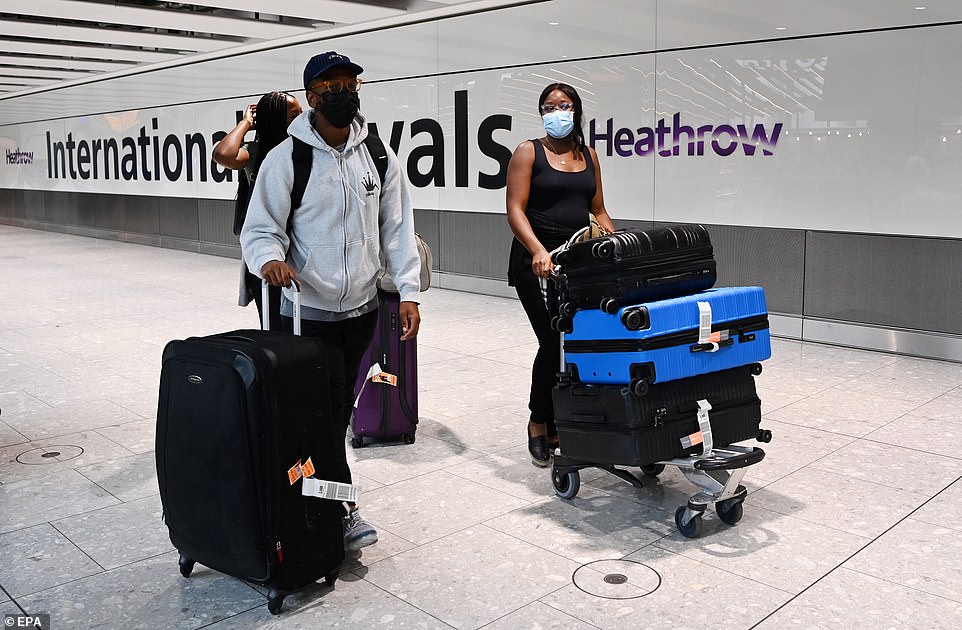
The push to create an amber watch list has been prompted by concern among health officials about the rise of the Beta variant in countries such as Spain. Heathrow Airport is pictured on July 31
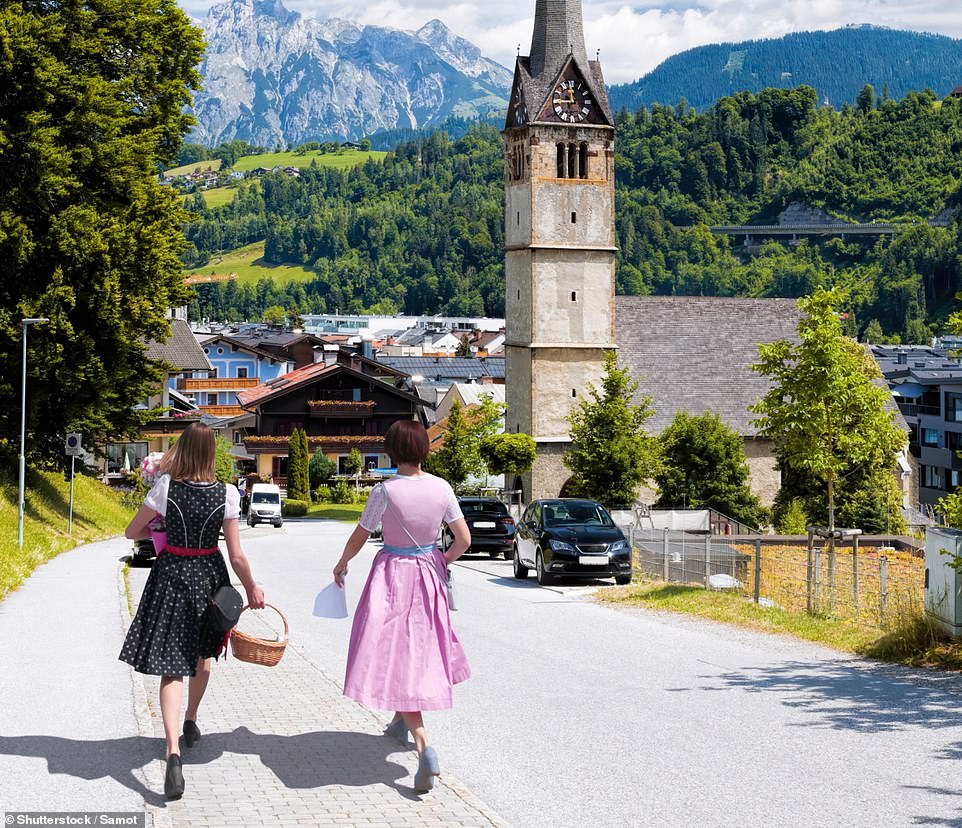
Countries including Germany, Austria (pictured), Poland and Canada, are among the countries most likely to go green due to low infection rates, according to travel experts
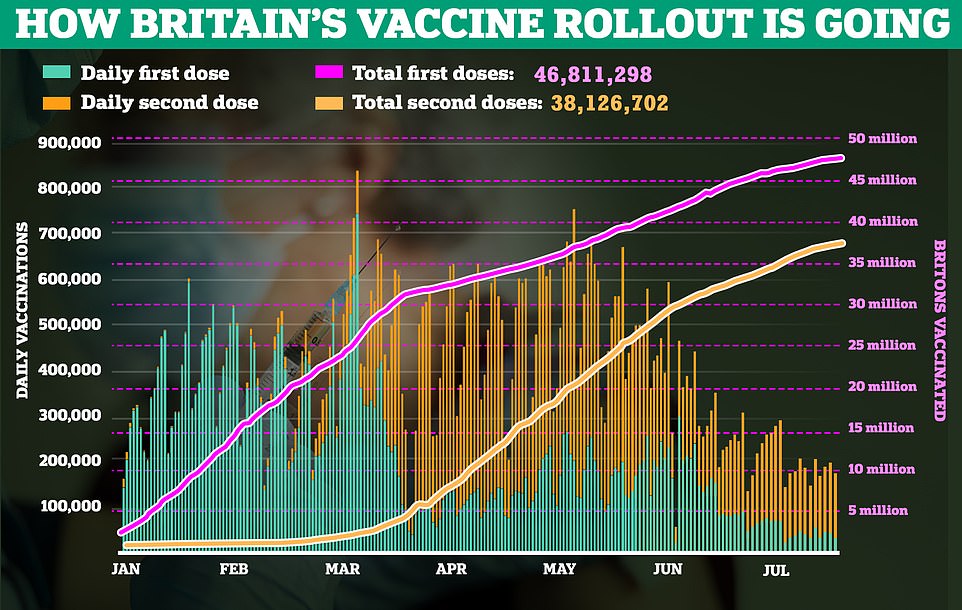
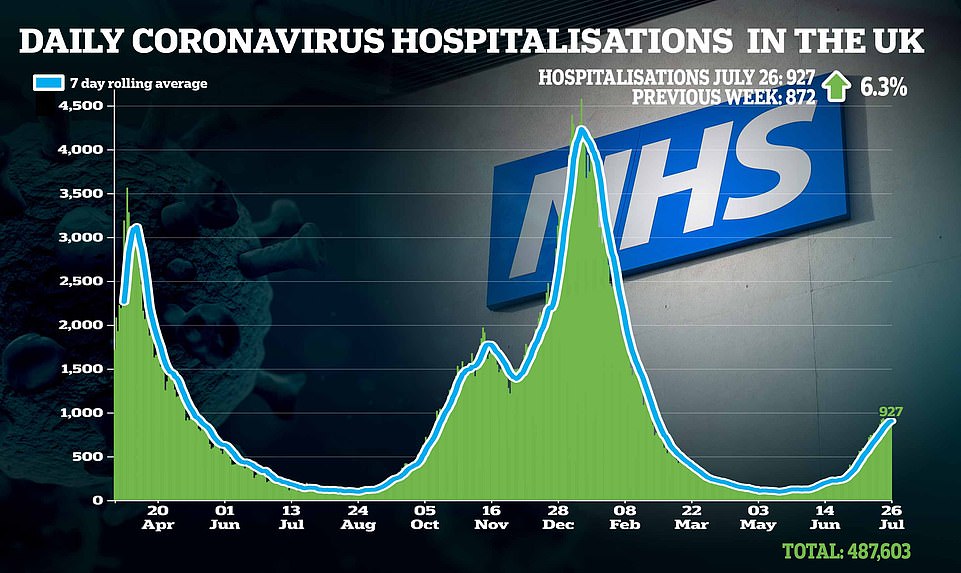
Fully vaccinated arrivals jabbed in the US or EU will no longer have to quarantine when arriving from amber list countries
Fully vaccinated arrivals to the UK who have been double jabbed in the US or the EU will no longer have to quarantine when arriving from amber list countries after a rule change.
Non-UK residents arriving from amber list countries have previously been forced to self-isolate when arriving in the UK – even if they have been double jabbed.
But from 4am today, the rules will change to allow them to enter the country providing they have been double vaccinated in either the US or an EU country.
The rule change will be a big boost for families abroad who have faced strict restrictions when planning visits to the UK since March last year.
The UK government has said the change, which was announced last week, will help to reunite family and friends whose loved ones live abroad.
Airline bosses have welcomed the move.
Travellers will still need to take either a lateral flow or PCR test pre-departure and a PCR test on the second day after they arrive.
Under-18s will be exempt from isolation, and some will not have to test, depending on their age.
Advertisement
An amber watch list would not carry quarantine restrictions of its own. But travellers would be warned their destination is on the brink of going on to the red list.
If it does, they would face the choice of rushing home before the deadline or paying £1,750 a head to quarantine in a Government-approved hotel when they return.
The Joint Biosecurity Centre, which analyses Covid data, is due to give ministers its latest assessment of the international threat.
They will then meet on Thursday to decide which countries should go in each category, and whether a new amber watch list is needed.
It comes as travel consultancy, the PC Agency, last night released research which suggested that 17 countries could join the green or green watchlist.
The research suggests 12 destinations, including Germany, Poland, Canada, Austria and Romania could go fully green – meaning even unvaccinated holiday makers can return to the UK without having to quarantine on their return.
According to the PC Agency, all 12 destinations have infection rates below 30 cases per 100,000 of the population – placing them significantly lower than the UK’s 286 cases per 100,000 people – and most have also jabbed more than half of their adult populations.
According to the research, reported in the Telegraph, a further five destinations, Bhutan, French Polynesia, North Macedonia, Norway and Saudi Arabia, have low enough infection rates to join the green watch list – which is the same as the green list but with the possibility of a sudden switch to the amber list looming.
Meanwhile, in another boost for British families, fully vaccinated arrivals to the UK who have been double jabbed in the US or the EU will no longer have to quarantine when arriving from amber list countries after a rule change.
Non-UK residents arriving from amber list countries have previously been forced to self-isolate when arriving in the UK – even if they have been double jabbed.
But from 4am today, the rules changed to allow them to enter the country providing they have been double vaccinated in either the US or an EU country.
The rule change will be a big boost for families abroad who have faced strict restrictions when planning visits to the UK since March last year.
The Government has said the change, which was announced last week, will help to reunite family and friends whose loved ones live abroad. Airline bosses have welcomed the move.
But travellers will still need to take either a lateral flow or PCR test pre-departure and a PCR test on the second day after they arrive. Under-18s will be exempt from isolation, and some will not have to test, depending on their age.
However, travel to the US for Brits – even those who are fully vaccinated – remains out of bounds as the Biden administration continues to stick to a hardline border policy.
Mr Alderslade said the UK change had prompted a 300 per cent increase in bookings from America. He said the key to kickstarting travel is to expand the green list.
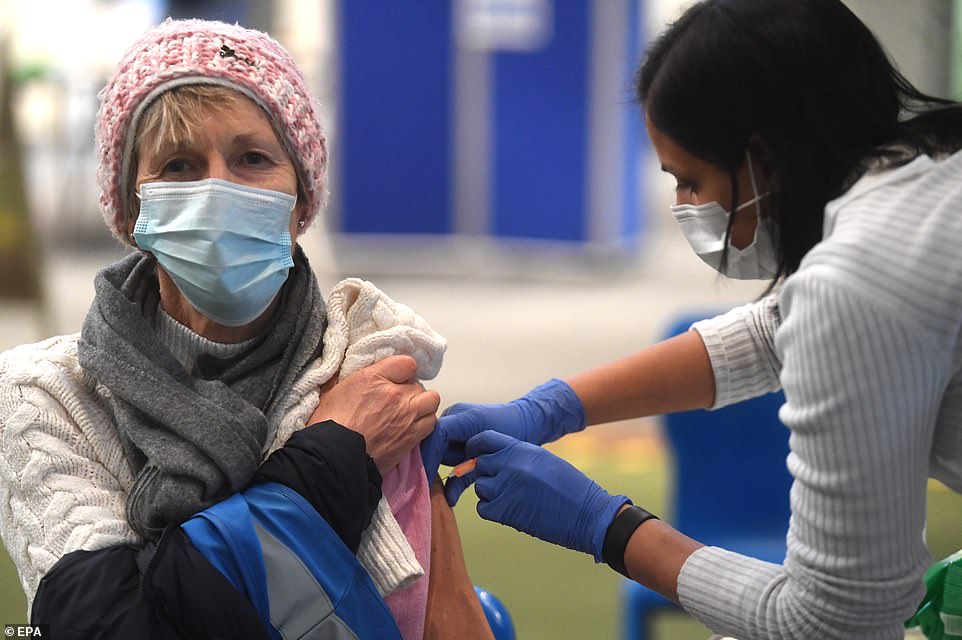
Pictured: A woman receives the AstraZeneca Covid19 vaccine at an NHS vaccination centre in Ealing, west London
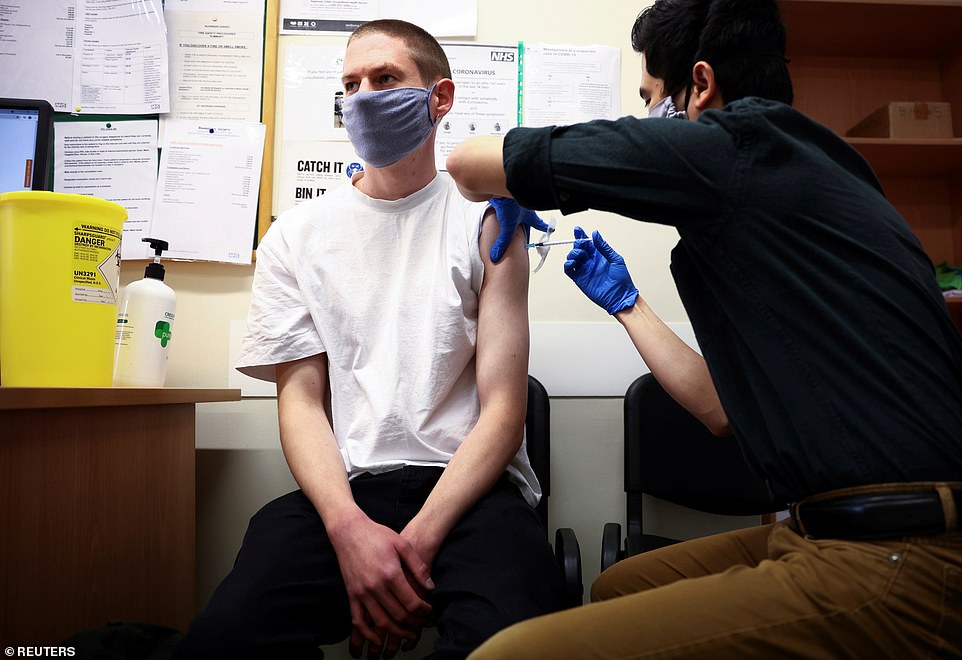
Pictured: A young person receives a dose of the Pfizer/BioNTech jab at a vaccination centre for young people and students at the Hunter Street Health Centre in London on June 5
Which jab combinations provided the best protection?
The early results from the Com-Cov trial, published today in the Lancet, looked at the efficacy of either two doses of Pfizer, two of AstraZeneca, or one of them followed by the other.
All second doses were given four weeks apart and the trial recruited 830 volunteers who were aged 50 and above. All combinations worked well, priming the immune system.
It found:
— AstraZeneca’s vaccine, followed by Pfizer’s, induced higher levels of antibodies and T cells than vice versa.
— Both antibodies and T cells, a type of white blood cell, play a crucial role in defending against Covid.
— The mix-match approach produced more antibodies than two regular doses of AstraZeneca’s, no matter which way round the jabs were given.
— The largest antibody levels were induced after two doses of Pfizer, and the highest T cell response was from AstraZeneca’s followed by Pfizer.
Advertisement
He told Times Radio: ‘I think the big issue for us as an industry is the green list… amber at the moment is a red flag for travellers, it’s a glaring warning sign because of the worry that people have that they will either be stranded overseas or they will have to quarantine either in a hotel or a home for 10 days.’
It comes as it was revealed last night how tens of millions of Britons are expected to be offered a Pfizer booster jab this autumn as the vaccine has proved to be the most effective against the Delta variant.
The booster scheme, which was announced earlier this year, is set to start in September and should see 23million over-50s, vulnerable Britons and NHS and care home staff offered a third dose.
Extra vaccines would be rolled out in two stages — prioritising those most at risk of Covid, before the programme is extended.
While patients were initially expected to be offered the jab they were originally inoculated with, it is understood all patients will be offered the Pfizer jab as it has proven to be the most effective against the Delta variant.
The Department of Health has yet to confirm the official details of the booster scheme, plans of which were first shared by the Joint Committee on Vaccination and Immunisation (JCVI) in June.
The JCVI is expected to issue its final advice in regards to the booster scheme in the coming months.
A senior government source also told the Times that those who received the AstraZeneca vaccine would ‘be getting an mRNA booster’.
MRNA used in the Pfizer and Moderna jabs is essentially a DNA instruction to tell your cells how to produce the harmless spike proteins from the virus – allowing your body to create an immune response without being exposed to the virus itself.
Oxford AstraZeneca is not an mRNA jab – instead using a weakened version of a common cold virus from chimpanzees that has been modified to contain genetic material shared by the coronavirus.
Again, this technique means the person receiving the jab is not exposed to the real virus – unlike previous jab types which often relied on weakened or dead forms of the actual virus.
A UK Government-backed study published earlier this year found that mixing and matching Covid vaccines may result in higher protection against the virus.
People who had been vaccinated with AstraZeneca’s jab initially and then received a top-up with Pfizer’s had nine times more antibodies than those who stuck to the UK vaccine.
Although antibodies are just one part of the immune response, the Oxford University researchers said the findings strongly suggested the approach could enhance immunity.
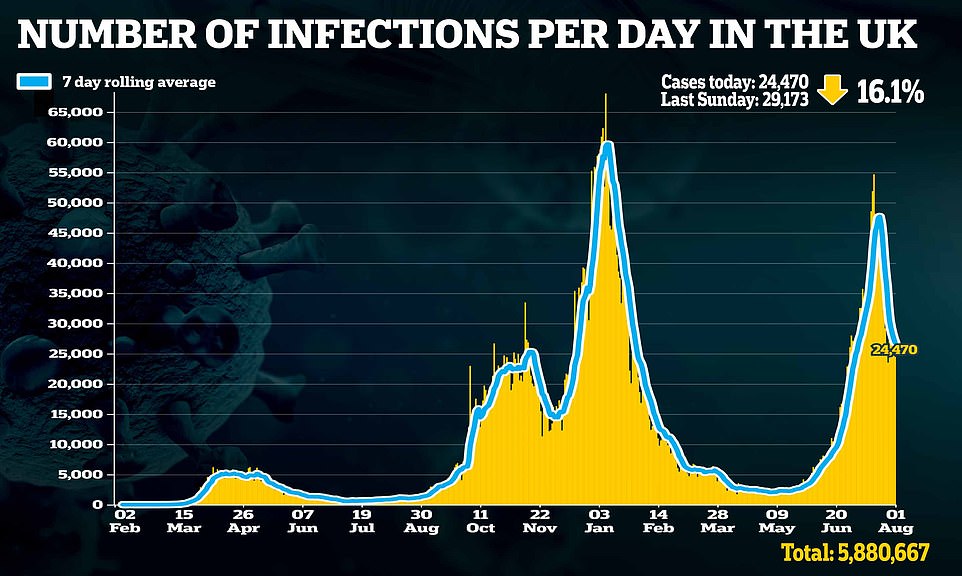
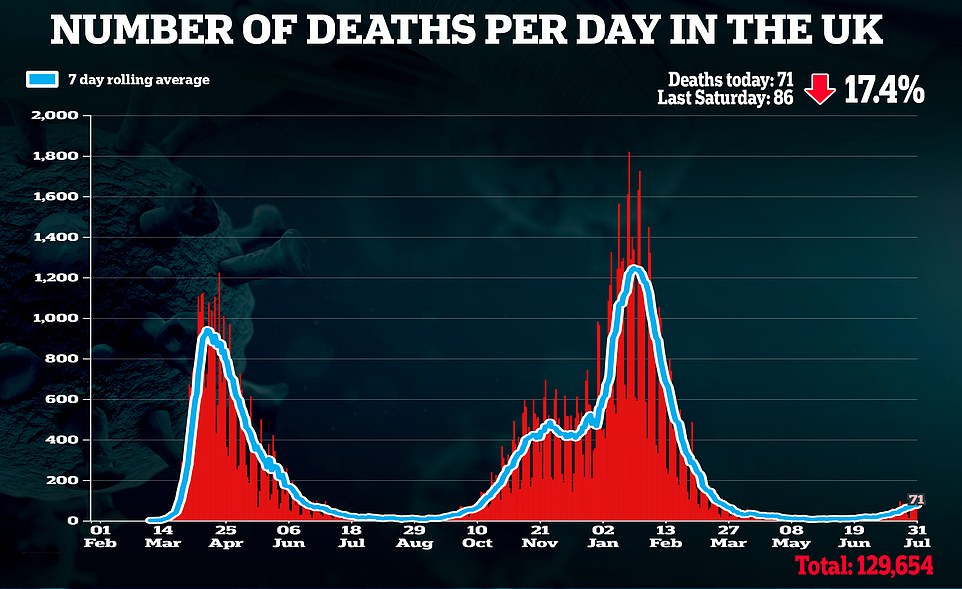
Three days working at home to become the new normal
The traditional working week is over with firms adopting a three-and-two approach – with fewer days in the office.
Having three days at home and two in the office is set to become the new normal as a result of the pandemic.
Many big firms have already agreed the changes, while the Institute of Directors said two thirds of business leaders will allow remote working. Roger Barker, the institute’s director of policy, said the pandemic had driven a revolution ‘greater than radical reform or regulation ever could have’.
And YouGov found just one in five bosses will require all staff to come in five days a week after the pandemic.
NatWest expects almost nine in ten staff to work at home while Asda said its employees could work from any location suited to their job.
Advertisement
But it is understood the mix and match approach is not going to be used in the short term more broadly because there is a ‘strong supply’ of each vaccine type.
A senior HSE source told the Times: ‘Currently there’s no need for it. Currently we have plenty of vaccines. The amount of vaccine isn’t an issue at all. There’s no plan to do it. It’s not under immediate consideration, but I wouldn’t rule it out.’
The Government said analysis has shown that the Pfizer vaccine is 96 per cent effective against the Delta variant while the Oxford/AstraZeneca vaccine is 92 per cent effective against hospitalisation after two doses.
A study published this week also showed that a third dose of the Pfizer vaccine could offer strong protection against the Delta variant.
Research showed that antibody levels increased five-fold among people ages 18 to 55 who were given the booster shot.
The third dose was especially effecting for the elderly, with antibody levels spiking 11-fold among people aged 65 to 85 who had already received the standard two doses.
In the slides published online, the researchers wrote there there is ‘estimated potential for up to 100-fold increase in Delta neutralization post-dose three compared to pre-dose three.’
The booster roll-out will coincide with the annual influenza inoculation programme, which health officials said will be vital this winter amid warnings of a difficult flu season.
Immunity gained from Covid jabs last for at least six months in the ‘majority’ of cases, but there are fears this could fade later in the year which could trigger a spike in hospitalisations and deaths.
An Oxford University trial looking at booster doses suggested a third shot six months after the second could restore peak immunity against Covid.
It comes as the week-on-week rate of Covid cases fell yesterday for the tenth day in a row with 26,144 infections marking a 17.8 per cent fall while deaths also fell to 71.
The latest data from Public Health England and Cambridge University suggests that about 60,000 deaths, 22 million infections and 52,600 hospitalisations have been prevented by vaccines.
The Government plans to lure young people in for their vaccinations with the promise of cut-price taxis and takeaways, as Boris Johnson tries to tackle the relatively low take-up among the under-30s.
Uber, Deliveroo and Pizza Pilgrims are among the companies in discussion with the Government about offering incentives as part of the ‘Jab 18-30’ drive.
So far, only two-thirds of people in that age bracket in England have received a first dose since they became eligible in June, compared with 88.4 per cent across all age groups, meaning more than three million 18-to-30-year-olds remain unjabbed.
Prizes for having the jab: As No. 10 plans to hand out Uber rides and takeaways, insiders reveal free coffee and cinema tickets could be new incentives to beat Covid vaccine hesitancy in youngsters
ByJason Groves Political Editor For The Daily Mailand Eleanor Hayward For The Daily Mail
Young people could be offered a free latte or cinema ticket in return for having the Covid jab under plans being discussed by ministers.
The Government yesterday announced commercial tie-ups that will see firms like Deliveroo and Uber offer discounted takeaways and taxi rides to people who sign up for vaccination.
A Government source said that further deals were expected in the coming days with cinema chains, coffee franchises and high street restaurants potentially involved.
However ministers have ruled out offering cash bribes as seen in the United States where newly-vaccinated citizens are to be offered $100 in cash, equal to £72.
‘There is a lot of work going on into broadening this out into other areas,’ the source said.
‘We will not be offering cash payments but we hope there will be a range of attractive high street incentives that will encourage more people to come forward and have the jab.’
Boris Johnson is said to be frustrated that 30 per cent of people aged under 30 have still not come forward for their first jab, more than six weeks after vaccinations were opened up to all adults.
A Government source said vaccinations in the age group were currently running at 40-50,000 a day, but added: ‘We’d like to be doing a lot more.’
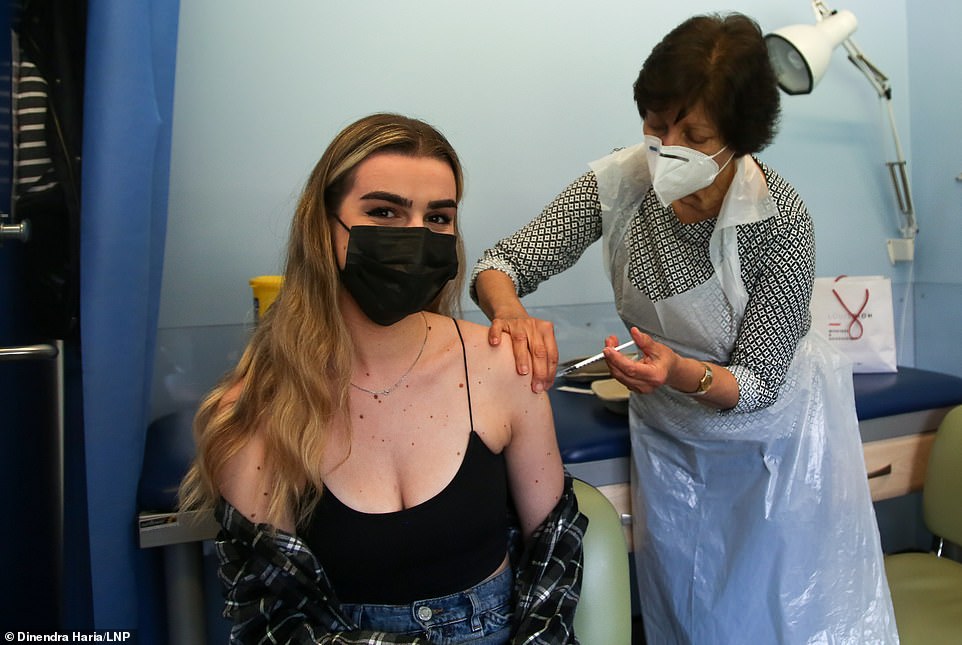
Young people could be offered a free latte or cinema ticket in return for having the Covid jab under plans being discussed by ministers. Pictured: Vaccinator Hari Roberts administers the first dose of the Pfizer Covid-19 vaccine to an 18 year old Zuzanna Szelag at a vaccination centre in north London
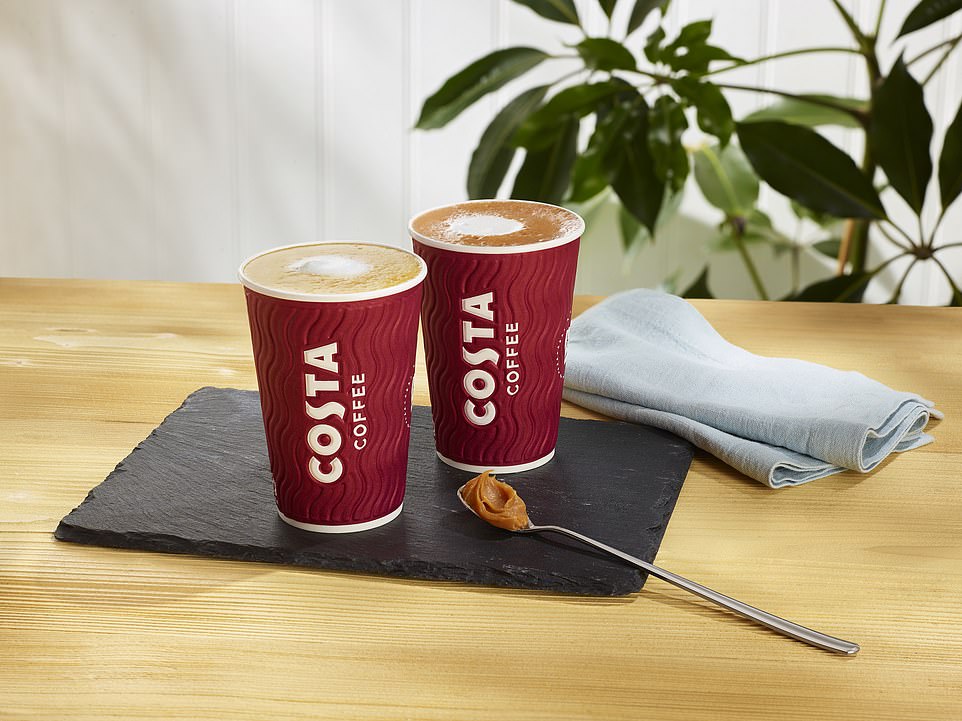
The Government yesterday announced commercial tie-ups that will see firms like Deliveroo and Uber offer discounted takeaways and taxi rides to people who sign up for vaccination. Coffee companies, like Costa, could also be involved
Enforcing vaccine passports ‘not a very British way to behave,’ says Jacob Rees-Mogg
Enforcing vaccine passports is ‘not a British way to behave’, Jacob Rees-Mogg has warned the Government.
The Leader of the Commons broke ranks to say the policy should only be considered for nightclubs, and even then only temporarily. Other ministers, including Boris Johnson, have suggested the passports could be used for concerts, sports events, business conferences, busy bars and even workplaces.
In a sign of Government nervousness over the issue, sources yesterday confirmed that ministers have abandoned plans to make Covid vaccines compulsory for university students. Mr Rees-Mogg said the Government had to consider the importance of preserving ‘ancient freedoms’, as well as controlling Covid. ‘We don’t want to get into a society where routinely people are expected to show their papers,’ he said.
‘That is not a British way to behave.’ His comments came as the Tory mutiny over vaccine passports continued to gather pace.
Andrew Bridgen, one of 43 Conservative MPs to sign a declaration opposing vaccine passports, yesterday said Parliament should be recalled from its summer recess if ministers are ‘serious’ about asking people to show proof of their vaccine status to gain entry to domestic venues and events.
Fellow Tory Bob Blackman said that even introducing vaccine passports for nightclubs would be a ‘slippery slope’.
Mr Blackman added: ‘When is a night club a pub or when is a pub a nightclub? If you start enforcing it in nightclubs, it will rapidly be enforced in pubs and restaurants.’ The call means cross-party backing is emerging for the Commons to return before September.
The PM has announced that he intends to change the rules in September so only those who are fully vaccinated can attend nightclubs. And last week Cabinet ministers Grant Shapps and Dominic Raab backed businesses operating so called ‘no jab, no job’ policies that only allow fully vaccinated people into the workforce.
But speaking on BBC Radio Four’s Any Questions, Mr Rees-Mogg said: ‘We have an ancient right to go about our lawful business without being expected to prove who we are or what we’re doing to anybody… we should protect our ancient freedoms very carefully.’
And Tory grandee Sir David Lidington told Times Radio that introducing a ‘Government certificate of approval’ to access certain events would set a ‘dangerous precedent’.
Advertisement
The move to offer incentives follows controversy over Government efforts to force young people to have the jab by introducing vaccine passports.
Tory MP Andrew Bridgen said: ‘I personally don’t think it would get through the House of Commons in any event and that’s why the Government has moved on to this carrot inducements for young people.’
Labour environment spokesman Luke Pollard said the party was ‘very cautious’ about domestic Covid passports with leader Sir Keir Starmer ruling out supporting them for use in ‘everyday life’ setting up the possibility of a Government defeat on the policy.
Uber, Bolt, Deliveroo and Pizza Pilgrims are among the first brands who will be offering incentives to encourage youngsters to get inoculated, Department for Health has announced.
Taxi app firm Uber will offer discounted rides and meals on its Uber Eats platform for young adults who receive a vaccine, while Deliveroo is planning to give vouchers to young people who get jabbed.
Mr Pollard, who dubbed the offer ‘kebabs for jabs’, said he doubted the concept ‘is going to be enough to get that last 30 per cent of young people’ vaccinated, and called for youngsters to be given more of a role in leading the campaign to get protected from the virus.
Ministers could also face questions about whether the plan complies with the Government’s anti-obesity strategy.
But they are determined to drive up vaccination rates among the young before the winter.
The vaccination rollout has slumped to the lowest rate since it began as demand slows to a trickle due to vaccine hesitancy in the young.
Currently first doses are averaging just 40,000 a day, compared with more than half a million a day in March.
Latest Government figures show that on Saturday there were just 38,851 first doses, compared with 212,159 second jabs. The fall in demand has forced doctors to send back unused vaccine doses to prevent them going out of date.
Dr Rosemary Leonard, an NHS GP, said on Twitter: ‘Please, please, could young people be allowed to get their vaccines earlier than eight weeks.
‘Numerous colleagues telling me of 100s of doses being thrown away, yet ‘early requesters’ at clinics being turned down.
‘I’ve heard of one clinic having to bin 1,000 doses of Pfizer because it had expired, yet turning people away for second dose.’
Some 170,000 doses of the Moderna vaccine are at risk of expiry within the next fortnight because not enough youngsters are coming forward, it is claimed.
Beccy Baird, a fellow at The King’s Fund, also said the young’s vaccine hesitancy is making it harder to know where to prioritise jabs.
So far 88 per cent of adults have had one dose and 72.5 per cent have had both doses.
In total, more than 85million doses have been administered across the UK.
Last night Health Secretary Sajid Javid said: ‘In under eight months, health services across the UK have delivered more than 85million doses – this is a phenomenal achievement.

A Government source said that further deals were expected in the coming days with cinema chains (pictured: Library image), coffee franchises and high street restaurants potentially involved
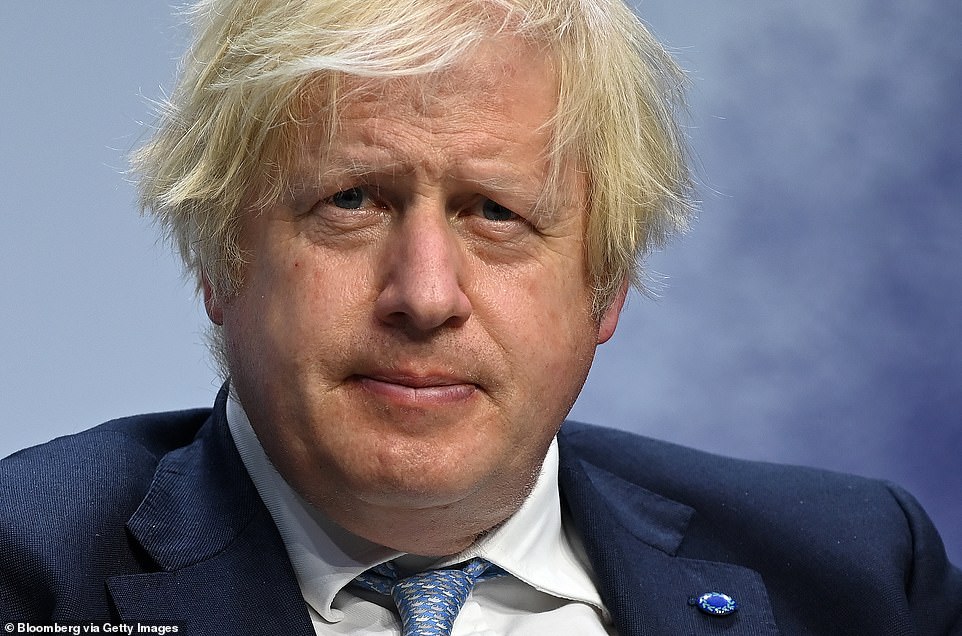
Boris Johnson (pictured) is said to be frustrated that 30 per cent of people aged under 30 have still not come forward for their first jab, more than six weeks after vaccinations were opened up to all adults
‘It has shown Britain at its best. From our NHS administering the jabs, to the Armed Forces, thousands of volunteers and civil servants, you have all played an important role in getting us to this life-saving milestone – and I want to thank you all for your tireless efforts.
‘Please get both of your jabs if you haven’t already to protect yourself and your loved ones.’
Ten-year age drop in Covid patients because of the vaccine rollout
The average age of Covid patients in intensive care has plummeted by ten years because of the vaccine rollout.
Over the past three months, the critically-ill have been 49 on average, compared with 59 in the second wave of the pandemic.
Around half of those admitted to intensive care units are under 50, and nearly one third under 40.
The NHS figures illustrate the dramatic success of vaccines in protecting older adults, almost all of whom have been double-jabbed. Wards are instead filling up with those most likely to be unvaccinated, including young adults, pregnant women and people from black or deprived communities.
Coronavirus is still in retreat across Britain, boosting hopes that the third wave is ebbing.
Weekly infections are down by 30 per cent and yesterday 24,470 cases were reported, down from a summer peak of 54,674 on July 17.
Another 65 deaths were logged while the number of patients in hospital with the virus has dropped slightly.
Daily hospital admissions for Covid have still not topped 1,000 a day despite warnings from scientists that this was inevitable. Another 911 were recorded yesterday, taking the total to 5,916. This compares with nearly 40,000 in January.
Although cases have been similar to the January peak, vaccines have slashed the numbers in hospital. Two doses provide over 90 per cent protection against hospitalisation.
A report by the Intensive Care National Audit & Research Centre looked at the 2,385 people admitted to intensive care with Covid since May 1.
This was compared with data from 25,810 patients admitted to ICUs during the second wave, from September last year through to April. It revealed admissions are soaring among groups of the population with high levels of vaccine hesitancy, including pregnant women.
The proportion of admissions in this group is twice as high as in the second wave. Some 29 per cent of women of childbearing age admitted to ICU since May were either pregnant or had recently given birth. This figure had been 14 per cent in the previous waves.
Separate research showed 99 per cent of pregnant women admitted to hospital with the virus had not been vaccinated.
Since April, pregnant women have been eligible for the vaccine at the same time as the rest of their age group but just one in 12 have come forward.
England’s chief midwife has written to GPs and midwives telling them to encourage expectant mothers to have a jab. Jacqueline Dunkley-Bent told pregnant women that ‘the jab can keep you, your baby and your loved ones, safe and out of hospital’.
The proportion of admissions among black Britons has also nearly doubled, reflecting higher vaccine hesitancy in some ethnic minority groups.
Nearly one in ten patients are black, compared with one in 20 in the second wave. Nearly four in ten admissions are now among the poorest 20 per cent of Britons, which is linked to lower vaccine uptake.
Stuart McDonald, of the Covid-19 Actuaries Group, which analyses admission data, said: ‘This virus has always discriminated. The more deprived in our society are both more likely to be exposed and more likely to get very ill once exposed.
‘In the third wave, the socio-economic gradient is worse than ever.
‘The most deprived fifth of the population are four times as likely to be admitted to ICU as the least deprived fifth.
‘This worsening inequality is surely a result of different vaccine uptake.’
Advertisement
Source link : https://www.dailymail.co.uk/news/article-9851347/Travel-bosses-blast-Government-plans-amber-watchlist.html












